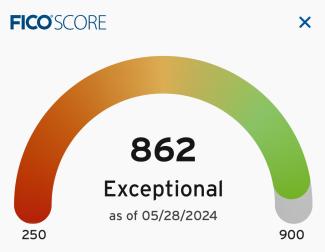
What impacts your FICO Score?
What is the financial impact of your FICO Score?
Your FICO Score is one of the most influential numbers in your financial life and it’s more than just a gateway to loans. It's a universal measure of creditworthiness used across multiple industries.
Let’s break down how your score impacts everything from home buying to renting, and what actually goes into calculating it.
🏦 Who Uses FICO Scores?
FICO Scores are used by a wide variety of companies to evaluate risk and reliability including:
🏡 Mortgage Lenders
Use FICO Scores to assess whether you qualify for a loan and at what interest rate.
🚗 Auto Lenders & Dealerships
Determine loan approval, lease terms, and how much interest you’ll pay on your next vehicle.
💳 Credit Card Companies
Use your score to set credit limits, APRs, and decide whether you qualify for rewards or balance transfer cards.
🏠 Landlords & Property Managers
Often screen tenants using FICO Scores to evaluate reliability and payment habits.
🏥 Insurance Companies
Some home and auto insurers factor in credit scores when setting your premium (varies by state regulation).
🎓 Student Loan Providers
Private lenders may use FICO Scores to approve new loans or refinance existing ones.
🏛️ Banks & Credit Unions
Use your score when reviewing applications for personal loans, HELOCs, and lines of credit.
📊 What makes up a FICO Score?
Your FICO Score is a dynamic number, typically ranging from 300 to 850, and is based on 5 key categories:
🧩 Factor | 📈 Weight |
|---|---|
✅ Payment History | 35% – Are you on time? |
💰 Amounts Owed | 30% – How much debt are you using? |
⏳ Length of Credit History | 15% – How long have you used credit? |
🔄 Credit Mix | 10% – Do you use multiple types of credit (loans + cards)? |
🆕 New Credit | 10% – Have you recently applied for credit? |
💡 Why does your FICO Score matter?
Your FICO Score isn’t just about loans. It can impact:
- 🏠 Whether you can buy or rent a home
- 🚘 Your car loan interest rate
- 🔐 Insurance premiums
- 💳 Credit card perks and approvals
- 🎓 Your student loan options
Even Dave Ramsey, a strong advocate for living debt-free, acknowledges that understanding your credit score is essential, especially if you’re navigating the real world of mortgages and insurance.
📅 How can you improve your FICO Score?
Understanding and managing your FICO Score is key to building long-term financial stability. Let’s talk about how to:
- 📈 Raise your credit score strategically
- 🧠 Avoid common credit mistakes
- 💼 Align your credit profile with future financial goals
👉 Schedule a free consultation with Lifetime Financial Planners
We’ll help you plan smarter. Credit included. 💙
